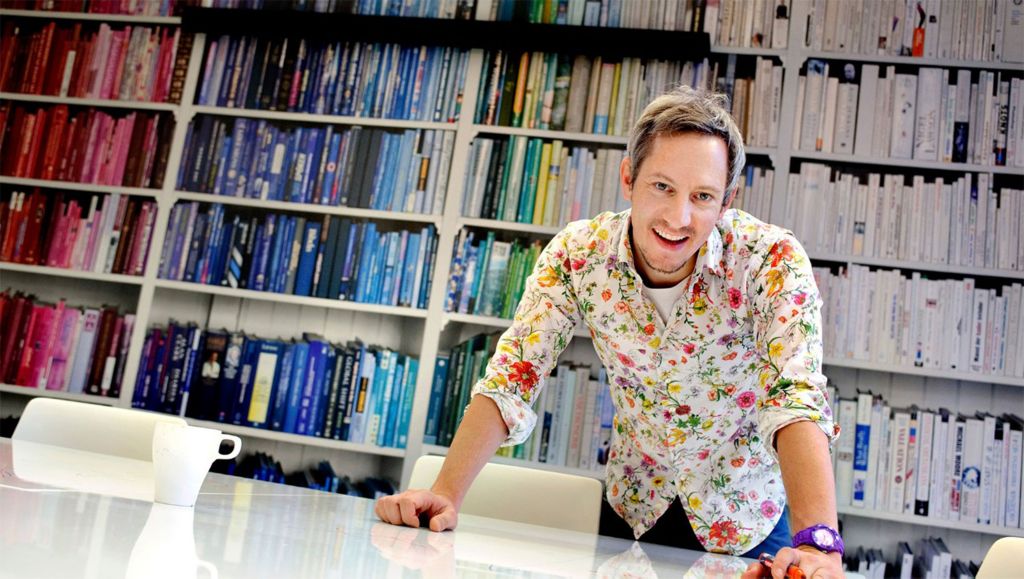What it feels like to say ‘Yes, and’


When Jens Nordberg talks about his background, it feels as though his role at Volvo Group Trucks Technology was quite literally predetermined. He has a master’s degree in computer science, experience from the German automotive industry, a degree in psychology and a burning interest in the theatre.
“It was my time in Germany that made me realise I needed to do something else. I was working as a risk management consultant and that included analysing why certain projects failed completely. This was largely due to human behaviour. So I started thinking about psychology. I was 33 when I started the psychology programme in Gothenburg, I graduated five years later and I joined the Volvo Group through my degree project,” explains Jens Nordberg, who works at the New Technologies & Innovation Department.
He has two main tasks. The first is to run creative facilitation – this may involve a team that has come to a standstill and needs help thinking outside the box to find new solutions for a product or service. The other task involves leading creativity courses for groups that want to develop their creative behaviour.
“It’s very largely a question of interpersonal behaviour and I then focus on presence and flows between individuals,” explains Jens, who takes advantage of his experience from both psychology and the theatre.
When new ideas are thought up and presented, it is human nature to be sceptical and questioning.
“Our brains are conditioned to be doubtful about new risks. Thinking critically is something we inherit and learn. Especially when we are under a great deal of pressure and we are operating in a harsh economic climate.”
Standard reactions include, “That’s a really good idea, but there isn’t any money”, “OK, but we need to think practically” or “Thanks, but let’s be logical for a moment”. Training to change behaviour could involve changing a single word and making a real difference.
“In improvisational theatre, we focus on observation, what it feels like to say ‘Yes, and’ instead of ‘Yes, but’. People have different strategies to avoid saying ‘Yes’ and, by using the word ‘but’, you put the brakes on and the flow stops. It is instead important to encourage ideas from other people, study and analyse them and see where they could lead. I do this on a really large scale to bring about change.”
Jens prefers to work in teams comprising eight to 10 people, so that he can study group behaviour and suggest changes.
Does this have an effect?
“Yes, it does – most often immediately. It’s a good sign when the group comes back and wants to develop still further.”
His picture of the Volvo Group is one of an innovative company with highly creative engineers. New inventions are regularly developed and, according to him, the difference when it comes to his role is that a dedicated resource is able to work on developing the methodology.
The creativity sessions often take place at the innovation laboratory in Gothenburg, where an architect has put the finishing touches to the design in order to create the most stimulating environment possible. Fictive bookcases, whiteboards throughout the room, small tables designed to enable people to work in pairs – this is the best setting for generating ideas.
Short breaks are also useful when it comes to enabling the brain to change direction.
“The larger the group, the less work each individual does. It isn’t a question of people being lazy, but, in large groups, it’s difficult for everyone to contribute in a way they think makes sense. Within psychology, this is known as ‘social loafing’.”
Jens Nordberg’s involvement in improvisational theatre began in earnest when he was 27 and he describes it as having a decisive impact on his life and offering a means of freedom. He is currently a member of the Gothenburg Improvisational Theatre, gbgimpro, and he sometimes travels abroad, most recently to Chicago, to continue his development. Architecture is another main interest and this also results in travelling to other countries to study buildings.
In his day-to-day life, he spends his mornings at the Volvo Group, where his objective is to change creative behaviour. In the afternoon, Jens works as a psychologist.
What is your relationship with the Volvo Group?
“I only knew one person here when I sent in my proposal for the degree project which eventually led to this assignment.
“However, I do have another relationship. My father was involved in a road accident, when he hit a truck. He ended up in a coma, but he survived. Now that I am here at the Volvo Group where active safety systems are being developed, it feels good if my role here is able to contribute to the continuation of creative development.”